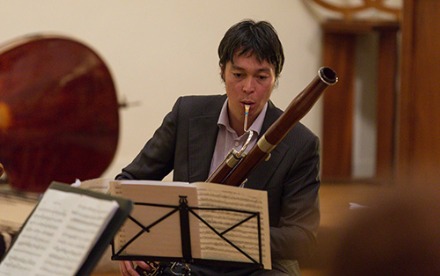
AYO Alumni: James Alyward

James graduated from Victorian College of the Arts, Melbourne in 2000 during which he won a number of prizes including the Willem van Otterloo scholarship which allowed him to later study in the Netherlands. He was Associate Principal Bassoon in both the Auckland Philharmonia in New Zealand and the West Australian Symphony Orchestra. Later he studied at the Conservatorium of Amsterdam with Jos de Lange, following masterclasses with Dag Jensen, Pascal Gallois and Matthew Wilkie. James is now a busy freelance bassoonist, involved in many chamber music projects and playing regularly with the major Dutch orchestras including Royal Concertgebouw Orchestra, Dutch Wind Ensemble, Netherlands Philharmonic Orchestra, Netherlands Symphony Orchestra, ASKO Schoenberg Ensemble.
You are an AYO Alumnus from 1999. What do you remember most from when you participated in AYO?
That year we were part of a small project in Sydney over New Year’s which to this day is still one of the most fun New Year’s Eves I’ve ever had. We also toured with a chamber orchestra around Queensland and the South Pacific which made the tour feel like a tropical holiday. The highlight was the concert in Vanuatu where after we had two days to enjoy the beautiful island.
What is it like coming back to tutor AYO musicians now?
It is a special feeling to tutor in an institution where you were once a student. I think this is even more noticeable with AYO as I’ve lived in Europe for such a long time now, so working with AYO reminds me of where I came from. Australia’s tradition of classical music is not as developed as in Europe it’s great to see so many Australians overcome this extra hurdle and make successful careers.
You’ve spent a number of days rehearsing with the musicians. What do you notice about them?
The main thing I notice when I am there is how old I am. Being with the musicians reminds me of my time as a student. There is a lot of confidence and enthusiasm but there is also still a lot to learn. When I was young I thought I knew everything but learnt later how much more there was to music. Honeck has done a very good job with them – from the first rehearsal he had the orchestra thinking more about their sound and musicality.
What piece of advice would you give to musicians who are just starting out?
I remember hearing once that the difference between really good and ordinary musicians is how they listen. Everyone thinks they listen but everyone can be trained to listen better. By this I mean being able to hear the sound one makes and adjusting it to fit in with everything else. I also think all musicians should try to study abroad. Australia can be very isolated and living in a different country is good for opening up the mind.
What do you love most about making music?
It is very easy to forget why we love making music when it becomes a job and it is good to try to remember what we love about music. For me music is about discovering ourselves and the world. It is about getting into other cultures, times and philosophies. But it is also so natural and conforming to basic scientific principles. Music is also incomplete without the performer so we are also part of the art which I think is very special. When I perform something I can put my own interpretation on this art and share it with the public.